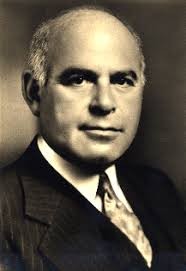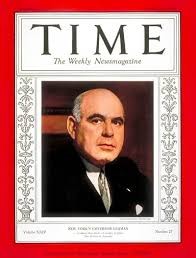About Herbert H. Lehman

The Lehman Center for American History was founded in honor of Herbert H. Lehman, a distinguished public servant whose career spanned business, military, state and national politics, and international administration.
He served in the United States Army in World War I, resigning in 1919 with the rank of colonel, the title of address he preferred until he became governor. After years of business success with his family’s financial services firm, Lehman left Wall Street in the 1920s to concentrate on public service. For much of his life, he was involved in a range of charitable and philanthropic activities concerned with combating poverty, racism, and anti-Semitism.
Herbert H. Lehman served two terms (1929-1933) as lieutenant governor of New York State under the administration of Governor Franklin D. Roosevelt, who referred to him as “my good right arm.” When FDR moved on to become President of the United States, Lehman succeeded him in Albany as Governor of New York, and he was elected for two-year terms in 1932, 1934, and 1936, and for the first four-year term in 1938. His most impressive reforms came in the area of labor legislation, the regulation of public utilities, and in his appointments, which were usually distinguished and which rarely smacked of partisan politics.
During World War II, at President Roosevelt’s request, Lehman became the Director-General of the United Nations Relief and Rehabilitation Administration. After more than four years of work in the multitudinous tasks of relief of civilian suffering in wartime, and many accomplishments and frustrations, he resigned in 1946.

After running unsuccessfully for the United States Senate in 1946, Lehman then capped his career in 1949 by defeating John Foster Dulles, who had an interim appointment, in a special election for the other Senate seat in New York. He then served as “the Conscience of the Senate” until his retirement from public service in 1956. Mr. Lehman died in 1963 on the eve of a trip to the White House to receive the Presidential Medal of Freedom. The citation, which he never read himself, is perhaps his best epitaph: “Citizen and Statesman, he has used wisdom and compassion as the tools of government and has made politics the highest form of public service.”
The following links offer resources to learn more about the life and legacy of Herbert H. Lehman:
The Library's biographical note on the Life and Legacy of Herbert H. Lehman offers an excellent introduction. Also see the short article "Ask Alma's Owl: Herbert H. Lehman's Columbia Legacy."
The Herbert H. Lehman Collections, including his personal and official papers and those of many related individuals and organizations, are housed in Columbia's Rare Book and Manuscript Library.
The Columbia Center for Oral History also houses a Herbert H. Lehman Project, which includes interviews with Lehman himself along with many others who knew and worked with him.
Duane Tananbaum's Herbert H. Lehman: A Political Biography offers a comprehensive scholarly account of Lehman's life and political career.